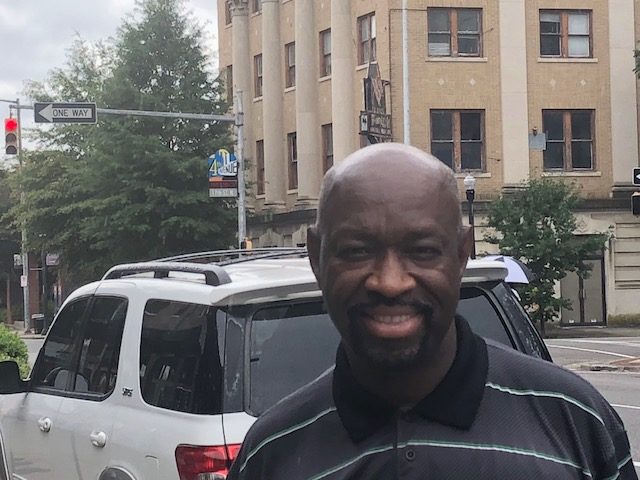
By Barnett Wright
The Birmingham Times
Pressure is mounting for Hezekiah Jackson IV, president of the Birmingham Metro Chapter of the National Association for the Advancement of Colored People (NAACP), to step down. Last week, longtime community activist Kamau Afrika joined those asking for Jackson to resign.
“I have called the national NAACP … and demanded that they remove Jackson,” wrote Afrika in an email. “I demand that Jackson be removed to save the reputation of the NAACP.”
Afrika asked Jackson to quit after emails surfaced revealing that Jackson asked neighborhood leaders and residents to not let the U.S. Environmental Protection Agency (EPA) test their soil because it would diminish their property values.
Community activists Carlos Chaverst and LaDarius Hilliard have also called for Jackson to resign, saying he was “morally unfit” to serve after former Alabama Rep. Oliver Robinson testified during a federal bribery trial that he paid Jackson $4,000 to convince North Birmingham residents to not get their soil tested for high levels of poison. The NAACP chief denied being paid, but he has not denied telling residents to not have their soil tested for contamination.
Targeted
Last month, a federal jury convicted a Birmingham lawyer and an Alabama coal company executive in a scheme to bribe Robinson to use his office to oppose EPA cleanup efforts in the area. Robinson pleaded guilty in September 2017 to conspiracy, bribery, wire fraud, and tax evasion.
Jackson has not been charged, and he denies any wrongdoing. That has not stopped several community activists from calling for his ouster.
In response, earlier this month, Jackson spent more than an hour on WJLD radio’s Gary Richardson Show addressing calls for his resignation. He discussed that and several other topics, including how he has always been targeted for being an openly gay black man and how he was “duped” by Robinson; he also said he has no plans to step down as president of the Birmingham Metro NAACP, a position he has held since 1998.
‘I Wasn’t Paid’
During the August 2 interview with Richardson, Jackson was asked whether he “never went to any neighborhood association meeting and told those folks not to have their soil tested.”
Jackson replied, “No, I didn’t say that. My position was clear that I wasn’t paid to do anything. I didn’t say anything in that Inglenook neighborhood meeting. Like I told you, when someone asked me, I told them I don’t see any benefits from the testing. So, if they’re going to come here, where the scientific evidence is saying there is no contamination, why are they testing?”
Jackson said in a follow-up interview that he was referring to the EPA when he said “they.”
According to minutes from the meeting in Inglenook, Jackson did speak. He said, “If the EPA targets the Inglenook neighborhood, this will change the look of our community. This could also stop businesses from moving into our community.”
Also during the radio interview, Jackson made a distinction about where he went to knock on doors to convince residents to not get their soil tested. North Birmingham was not one of those areas, he said.
“Inglenook? Yes, I went to the neighborhood meeting. Tarrant? Yes, I went to two churches with Amanda [Robinson, Oliver’s daughter], but it’s back to the same thing: all that was in my mind was trying to educate the community about the pros and the cons. Then the health department, the [Alabama Department of Environmental Management], and all the other official environmental testers said the air quality in those two areas was good.”
‘Unannounced Visit’
Jackson said he once considered Robinson a friend when Robinson wanted to get into politics.
“I was his campaign manager in 1998, and he was elected to the [Alabama] House of Representatives,” Jackson said, noting that he had lost contact with Robinson after that time.
Jackson said he was surprised when Robinson showed up “unannounced” at his NAACP office in October 2015.
“I was happy to see him,” Jackson said. “He said he needed my help because a serious injustice was going on in the black community … dealing with the EPA. … I let him know, you know, I’m not a fan of the EPA because I don’t like the way they do business in the black community.”
In a follow-up meeting, Robinson brought up his daughter, Amanda, who was graduating from law school, Jackson said.
“When [she] contacted me, … I said, ‘This is going to be an educational endeavor where you’re going to educate the people about the pros and the cons of the work of the EPA.’ She said, ‘Yes.’”
Jackson did not deny the existence of emails relating to his work with Robinson’s daughter, who ran Get Smart Tarrant, the grass roots organization fighting against the EPA’s soil-testing efforts. He also said he had no recollection of invoices that showed him being paid, which he also said during his testimony before a federal grand jury.
“Anyone can make up an invoice,” Jackson told Richardson during the radio interview. “I went into the grand jury, and that’s when they showed me those invoices I had never seen before in my life and I had no knowledge of. I testified to that, on the record, under oath.”
According to exhibits filed in court Jackson was paid for community engagement: $1,500 to $2,000 a month in 2015 and 2016 to promote the “facts” of the potentially responsible polluters who were fighting against taking responsibility for high levels of poisons, including lead and arsenic, in the community.
“Duped”
Richardson asked Jackson whether he was “duped?”
“Of course, I was—and that very seldom happens,” Jackson replied. “But, of course, I was.”
Jackson said he will never step down as NAACP president because his whole life has “been about not stepping down.”
“I might get knocked down, but I’ll never step down,” he said. “I’m always being approached by people in the human rights community about doing documentaries about me because they ask, ‘Wow, how have you survived all 60 years being openly gay? No one has killed you, and … you’ve been in all these treacherous waters like politics.”
‘Defining Moment’
Jackson said his journey began at age 7.
“I was on my way to school, right after my mother had just admonished me, telling me there are certain things boys just don’t do. I was trying to satisfy my mother.
“Some girls were outside playing with ribbons, and one of the girls said, ‘Hezekiah Jackson.’ I said, ‘Hey, y’all.’ The girls said, ‘You’re a scaredy-cat’ … because you won’t put one of these ribbons in your hair and go up to the school. So, I said, ‘Give me one,’ and I put the ribbon in my hair. When I got to school, the principal met me at the door and said, ‘Oh, hell no. What’s wrong with you, boy?’ I said, ‘Well, why can’t I wear a ribbon in my hair?’”
That was one of the “defining moments” in his life, Jackson said.
“My mother, my daddy, were saying, ‘This is going to make life hard for you, people are going to persecute you.’ I said, ‘Well, let them. I am going to live my truth. If I don’t live to be but 10 years old, I’m going to live my truth.’
“This is the truth, and that’s all I have. So, I’ll never step down” as Birmingham NAACP president, said Jackson, who added his truth was also that he did nothing to harm residents in North Birmingham, Inglenook and other areas experiencing environmental issues.




